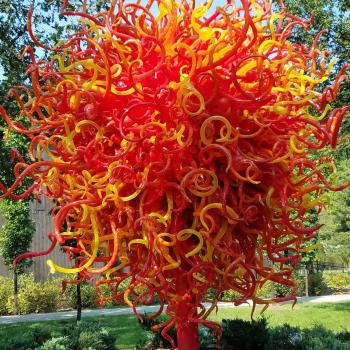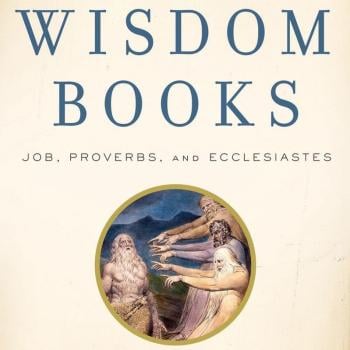 One of my former Asbury Seminary students, who is a violinist, came up to me in church this morning so excited. She had met the master (no not that Jewish Master, another Jewish master— musician) and gotten his autograph. She was simply bubbling over with joy. I must admit I was as well after seeing him perform from the third row last Saturday night in Singletary auditorium in Lexington.
One of my former Asbury Seminary students, who is a violinist, came up to me in church this morning so excited. She had met the master (no not that Jewish Master, another Jewish master— musician) and gotten his autograph. She was simply bubbling over with joy. I must admit I was as well after seeing him perform from the third row last Saturday night in Singletary auditorium in Lexington.
The story of Itzak Perlman is a moving one. Born in 1945 in Tel Aviv in what was then called Palestine, he has gone on to overcome enormous obstacles, including having contracted polio when he was four, to become one of the great violinists of his time. Not to mention that he plays one of the great musical instruments of any kind ever— a Stradavarius violin (made in 1714) which had formerly belong to another great Jewish violinist— Yehudi Menuhin. For a brief 35 or so minutes last night, we were all entranced by Itzak’s performance of the beautiful Mendelsohn violin concerto (a concerto written by a Jewish composer), accompanied by a very competent U.K. student orchestra who impressed me greatly.
There are many stories one could tell about Itzak, who is of course named after the Biblical Isaac. Perlman was a child prodigy, and he made his Carnegie Hall debut when still a teen— in 1963. My children remember him from the 1970s and 1980s on Sesame Street, for Perlman is a giver— an educator, not merely a virtuoso performer. He has conducted great symphonies performed for Queen Elizabeth and Presidents (including at the Inauguration of our present President— playing a John Williams piece called ‘Air’ and the famous Shaker hymn from Kentucky– ‘Simple Gifts’. It was also Itzak who provided the violin parts so full of pathos for the film ‘Schindler’s List’. He has been, and is, a national treasure, and Lexington was blessed to see him before he retires, last night. Itzak and his wife have five children, the youngest of whom, Rami, is in the rock band Something for Rockets. Itzak himself has branched out as well— he recorded a jazz album with famous jazz pianist Oscar Peterson before he died. Less well known is that he also plays a specifically Jewish kind of music called Klezmer music.
There is a legendary story about one of Itzak’s performances in 1995— Here is part of the article about it—- ”
On Nov. 18, 1995, Itzhak Perlman, the violinist, came on stage to give a concert at Avery Fisher Hall at Lincoln Center in New York City.
If you have ever been to a Perlman concert, you know that getting on stage is no small achievement for him. He was stricken with polio as a child, and so he has braces on both legs and walks with the aid of two crutches. To see him walk across the stage one step at a time, painfully and slowly, is an awesome sight.
He walks painfully, yet majestically, until he reaches his chair. Then he sits down, slowly, puts his crutches on the floor, undoes the clasps on his legs, tucks one foot back and extends the other foot forward. Then he bends down and picks up the violin, puts it under his chin, nods to the conductor and proceeds to play.
By now, the audience is used to this ritual. They sit quietly while he makes his way across the stage to his chair. They
remain reverently silent while he undoes the clasps on his legs. They wait until he is ready to play.
But this time, something went wrong. Just as he finished the first few bars, one of the strings on his violin broke. You
could hear it snap – it went off like gunfire across the room. There was no mistaking what that sound meant. There was no mistaking what he had to do.
We figured that he would have to get up, put on the clasps again, pick up the crutches and limp his way off stage – to either find another violin or else find another string for this one. But he didn’t. Instead, he waited a moment, closed his eyes and then signaled the conductor to begin again.
The orchestra began, and he played from where he had left off. And he played with such passion and such power and such purity as they had never heard before.
Of course, anyone knows that it is impossible to play a symphonic work with just three strings. I know that, and you know that, but that night Itzhak Perlman refused to
know that.
You could see him modulating, changing, re-composing the piece in his head. At one point, it sounded like he was de-tuning the strings to get new sounds from them that they had never made before.
When he finished, there was an awesome silence in the room. And then people rose and cheered. There was an extraordinary outburst of applause from every corner of the auditorium. We were all on our feet, screaming and cheering, doing everything we could to show how much we appreciated what he had done.
He smiled, wiped the sweat from this brow, raised his bow to quiet us, and then he said – not boastfully, but in a quiet, pensive, reverent tone – “You know, sometimes it is the artist’s task to find out how much music you can still make with what you have left.”
———–
It is not completely clear this story is entirely true, but it certainly ought to be. And Perlman’s concluding line is a pearl of great price. It’s a question I ask myself these days—- how much music can I still make with what’s I’ve got left, that is before I am ‘made God’s music’ in heaven, as John Donne once put it.
Sometimes when we think of the contributions of Jewish people to Western society, we are prone to think of scientific contributions (say Einstein) or modern psychology (think Freud) or educational contributions, but they have made enormous contributions to the arts, and especially to classical music for which we should be eternally thankful. God has gifted us all differently.
I hope all of you will get to see Itzak Perlman on his current tour or soon. It is a blessing from God, and one you don’t want to miss. He’s an overcomer in life, and an inspiration to us all.














